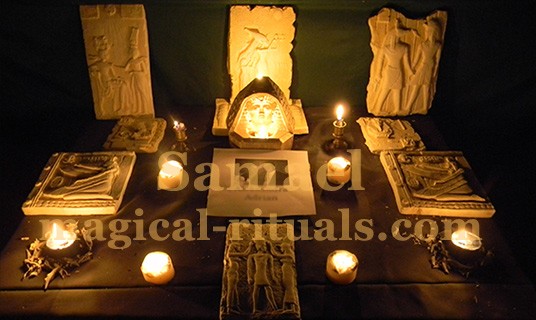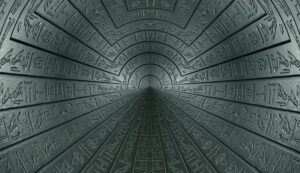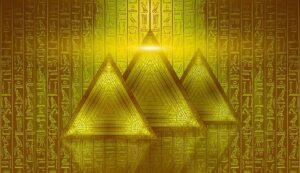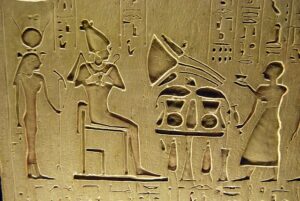
List of egyptian spells
Table of Contents
What Is Egyptian Magic (Heka)?
Heka was not just a practice but also a force of creation, believed to exist since the beginning of time. It was seen as a divine energy that connected humans to the gods, the cosmos, and the natural world. Unlike modern interpretations of magic, Egyptians viewed heka as a way to maintain cosmic balance and harmony rather than as a means to manipulate or control outcomes selfishly.
In ancient Egyptian magic, practitioners often called upon deities and invoked cosmic forces to perform spells. These spells could be used for protection, love, health, fertility, prosperity, and guidance in the afterlife.

Protection Spells
Protection was a significant focus of Egyptian magic, as the ancient Egyptians believed in both spiritual and physical dangers. They used a variety of spells and symbols to ward off harmful forces and ensure the safety of themselves and their loved ones.
1. Spell of the Eye of Horus
The Eye of Horus (also known as the Wadjet eye) is one of the most powerful symbols in Egyptian magic, representing protection, healing, and divine intervention. It was often used in spells to protect against evil spirits, illness, and harm.
- How it was used: Amulets and talismans depicting the Eye of Horus were worn or placed in the home to guard against danger.
- Incantation: Egyptians would chant: “May the Eye of Horus watch over me, may it heal my wounds and ward off all harm.”
2. Amulet of the Scarab
The scarab beetle was associated with the god Khepri, symbolizing transformation, rebirth, and protection. Scarab amulets were often worn to protect the wearer from misfortune.
- Function: Scarab amulets were believed to ensure safe passage through dangerous environments and offer protection in battle.
- Ritual: Scarabs were also placed in the tombs of the deceased to protect them in the afterlife.
3. Spell for Protection from Serpents
Serpents were considered a significant threat in Egypt, both physically and symbolically. Protection from serpents was a common concern, and specific spells were used to repel snakes.
- Method: The spell involved creating an amulet shaped like a serpent’s head or using a figure of the god Thoth, who was believed to have power over dangerous creatures.
- Chant: “O great Thoth, protector of knowledge, keep me safe from the serpent’s bite, let no venom harm me.”
4. Protection Against Evil Spirits
Ancient Egyptians believed in malevolent spirits that could cause illness, misfortune, or death. Spells were performed to protect individuals from these unseen forces.
- Amulet: Figures of the dwarf god Bes, known for his protective qualities, were placed in homes and carried for personal safety.
- Ritual: A figure of Bes would be invoked with a candle ritual and offering, with words like: “Bes, guardian of the hearth, shield this house from evil spirits and keep my family safe.”

Love and Attraction Spells
The desire to attract love, maintain passion, and secure fidelity were key aspects of Egyptian love magic. Invocations to gods and goddesses such as Hathor, Isis, and Bes were commonly employed to ensure success in romantic endeavors.
Read: https://magical-rituals.com/blog/2024/11/10/the-role-of-astrology-in-ancient-egyptian-love-magic/
1. Hathor’s Love Spell
As the goddess of love, beauty, and joy, Hathor was frequently called upon for love spells aimed at attracting a romantic partner or igniting passion.
- Ritual: Practitioners would place rose petals and perfumes at an altar to Hathor, lighting candles and chanting: “Hathor, goddess of love, draw to me the one whose heart is pure, let passion be my guide, and love my companion.”
2. Isis’s Binding Spell
Isis, the goddess of magic and marriage, was invoked in binding spells to secure loyalty and fidelity within romantic relationships. These spells were particularly popular among married couples.
- Method: Binding spells often involved inscribing the names of the couple on a small piece of papyrus and tying it with red thread.
- Incantation: “By Isis, I bind our love as strong as the Nile flows, unbreakable and eternal.”
3. Love Potions and Incantations
The ancient Egyptians were skilled in the art of creating love potions, which were crafted using herbs, flowers, and oils with aphrodisiac properties, such as mandrake and lotus flowers.
- Potion Recipe: Mandrake root would be boiled with honey and placed under the moonlight, infused with incantations for attraction.
- Chant: “With the sweetness of this brew, may love flow to me, may my heart be filled with the passion of the gods.”

Healing Spells and Rituals
Health and healing were central to Egyptian magic, with many spells dedicated to curing illness, relieving pain, and promoting overall well-being.
1. Spell of the Blue Lotus
The blue lotus flower symbolized healing, regeneration, and eternal life. It was used in spells to bring relief from illness and restore vitality.
- Method: The practitioner would soak blue lotus petals in water and wash the sick person with the infusion while reciting healing words: “Blue lotus of the Nile, restore the body, renew the spirit, let health bloom again.”
2. Healing Waters of Anuket
Anuket, the goddess of the Nile, was associated with the healing powers of water. Egyptians often invoked her in spells to cleanse the body and spirit.
- Ritual: Water from the Nile was collected and blessed in her name, used in baths or poured over the sick person.
- Incantation: “By the waters of Anuket, may all illness be washed away, may strength and health return as the river flows.”
3. Incantation for Physical Health
Spells for health frequently invoked the goddess Sekhmet, a fierce protector and healer. Her fiery power was called upon to drive illness from the body.
- Chant: “Sekhmet, great healer, burn away this sickness, let health and vitality rise in me once more.”
I invite you to watch the video of casting the Egyptian spell
Fertility and Childbirth Spells
The ancient Egyptians placed great emphasis on fertility and childbirth, and many spells were dedicated to ensuring a woman’s fertility or protecting her during pregnancy.
1. The Spell of Bes
Bes, the dwarf god of fertility, was often invoked to protect women during childbirth and ensure the healthy delivery of a child.
- Amulet: Figurines of Bes were worn or placed under the bed during childbirth for protection.
- Incantation: “Bes, protector of the mother and child, be with us now, guard this birth with your might, and bring forth a healthy child.”
2. Hathor’s Blessing of Fertility
As a goddess of fertility, Hathor was frequently asked to bless couples wishing to conceive.
- Ritual: Offerings of fruit, milk, and incense were placed at her shrine.
- Chant: “Hathor, goddess of life, bless this union with fertility, may the womb be fruitful and the child be healthy.”
3. Protection for Pregnant Women
Pregnant women often sought protection from evil spirits that might harm them or their unborn child. Spells were used to ward off these entities.
- Method: The pregnant woman would wear a hippopotamus-shaped amulet representing the goddess Taweret, who was believed to protect mothers and children.
- Chant: “Taweret, great mother, shield this woman and her child, let no harm come near.”
Funeral and Afterlife Spells
The afterlife was a critical concern in Egyptian culture, and many spells were dedicated to ensuring a safe journey through the underworld and a prosperous existence in the afterlife.
1. Spells from the Book of the Dead
The Book of the Dead contains a collection of funerary spells meant to guide the deceased through the dangers of the afterlife and into the realm of the gods.
- Popular Spell: The Spell of the Heart was recited to ensure the deceased’s heart would not betray them during judgment in the underworld: “My heart, do not stand against me in judgment; may you weigh light as a feather.”
2. Opening the Mouth Ritual
This ritual was performed to restore the senses of the deceased so they could eat, drink, and speak in the afterlife.
- Method: The ceremony involved priests touching the mouth of the mummy with a ceremonial tool to “open” it.
- Incantation: “May this mouth be opened to speak, to eat, to drink, and live eternally.”
3. Spell for a Safe Journey Through the Underworld
Egyptians believed in various dangerous trials in the afterlife, and specific spells were designed to protect the soul during its journey.
- Ritual: Protective symbols like the djed pillar were placed in the tomb.
- Chant: “Osiris, lord of the dead, guide me safely through the trials, let me pass through the underworld unharmed.”
Wealth and Prosperity Spells
Egyptians also performed spells to ensure wealth, abundance, and prosperity in life.
1. Spell of the Green God Geb
Geb, the earth god, was invoked to bring prosperity through agriculture and fertility of the land.
- Ritual: Offerings of grain and fruit were made at Geb’s altar.
- Chant: “Geb, giver of the earth’s bounty, let the fields grow rich, let abundance flow.”
2. Prosperity Ritual to Hapi
Hapi, the god of the Nile, was associated with the river’s annual flooding, which brought fertility and prosperity to Egypt’s lands.
- Method: Farmers and laborers would leave offerings at the Nile to ensure a bountiful harvest.
- Chant: “Hapi, who nourishes the earth, let the waters rise and wealth flow into our hands.”
Dream and Divination Spells
Dreams and divination were integral to Egyptian magic, as dreams were believed to provide insights into the future and divine will.
1. Dream Incubation Ritual
Dreams were considered a way to communicate with the gods, and dream incubation was a method of inducing prophetic dreams.
- Ritual: The practitioner would sleep in a temple dedicated to a specific deity, such as Thoth, the god of wisdom.
- Chant: “Thoth, lord of knowledge, grant me visions in my sleep, reveal the path I must walk.”
2. Oracle of the Pharaoh
Pharaohs were believed to possess divine wisdom, and their words were often considered prophetic. Egyptians sought the oracle of the pharaoh for guidance on important matters.
- Method: A question would be asked of the pharaoh or his representatives, and an interpretation of divine will would be given.
- Incantation: “Pharaoh, living god, speak the words of the divine, guide us to prosperity and truth.”
Conclusion
Egyptian magic, deeply intertwined with their religion and daily life, covered a vast range of needs from protection and healing to love and prosperity. Through their spells, ancient Egyptians sought to harness the divine power of the gods to influence their world and the unseen realms. Whether inscribed on amulets, chanted during rituals, or used in daily life, these spells reflect the profound spirituality and complexity of ancient Egyptian society.
Bibliography:
1. “Egyptian Love Spells and Rituals” – Medium. A modern look at ancient Egyptian love magic, its rituals, and their enduring influence.
2. “Types of Egyptian Love Magic” – Medium. Discusses the diversity of Egyptian love spells, from simple charms to complex rituals involving offerings and symbolic gestures.
3. “The Most Important Symbols Used in Egyptian Love Spells” – Medium. Explores the symbolic language of love spells and their significance in ancient Egyptian culture.
4. “Authentic Egyptian Love Rituals” – Medium. Focuses on traditional rituals for love, incorporating ancient practices with modern adaptations.
5. “Egyptian Love Magic: Facts and Myths” – Medium. Analyzes common misconceptions about Egyptian love magic and its historical basis.




